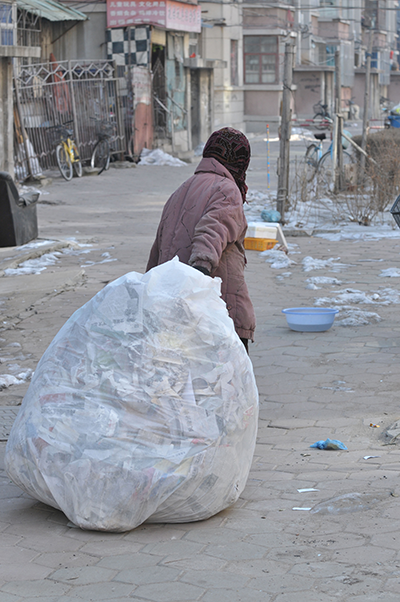They are a sight common in South Africa as they scavenge landfills and go through bins in suburbs, business and industrial districts. Yet little is known about the role waste pickers play in the economy.
Sights set on shedding light on the factors that enable waste pickers to make a living, Professor Derick Blaauw of the Faculty of Economic and Management Sciences at the Potchefstroom Campus of the North-West University (NWU) formed part of an interdisciplinary research team that included Prof Rinie Schenck of the University of the Western Cape and Dr Kotie Viljoen from the University of Johannesburg.The research team started off by doing a systematic review of the existing research and literature on waste pickers in South Africa. Their aim was to determine what research had already been done on closing the gap between the formal and informal economy with reference to waste pickers, and what factors could assist or facilitate the functioning of the country’s waste pickers.

Waste pickers are a permanent feature of the South African informal economy.
In the first quarter of 2014 there were 2,446 million people, or 12,3% of the South African labour force of approximately 20 million, trying to make a living in the informal economy. This excludes the agricultural sector. Given that South Africa has one of the highest unemployment rates in the world (25,2%), more people should theoretically be able to enter the informal economy. In India, for example, about 90% of the population make a living in the informal sector. The research team therefore wanted to know if the low number of people in the South African informal economy is an indication of an environment that is not very enabling.
The waste economy
The research team unpacked the major theme of facilitating the “recognition” of waste pickers so as to enhance their functioning in the informal economy. The literature showed that most waste pickers do the work to survive, and that there is a structural gap between the formal and informal waste economy. To change that, there must be recognition of waste pickers at the national, provincial and local policy level.
Here are some important findings from the study.
- Most existing studies on waste picking are small scale and quantitative, and so a national study is needed to provide a broader picture of the waste pickers and their socio-economic circumstances - the research team have embarked on this road already.
- Qualitative studies will be able to register the voices of the waste pickers, including how they perceive their circumstances, their wellbeing, their future and what recognition they want.
- Identification and evaluation of current projects and programmes are needed to determine best-practice models that can guide the national, provincial and local governments, as well as NGOs.
- It might also be useful to do studies on the amount of waste salvaged by waste pickers from the streets and landfill sites. This will hopefully enhance society’s appreciation of the waste pickers.
- Studies are needed to determine the possible role waste pickers can play in the broader waste management system.
Other questions that require answers are: who should take responsibility for interacting with the waste pickers and looking into their operational needs; who should collaborate with them and how, and who should provide the services suggested in the literature?
Waste pickers are here to stay
Waste pickers are a permanent feature of the South African informal economy. They can be viewed as part of a problem or the solution. Deciding on the first option will be counterproductive and could represent a significant lost opportunity. The second option is the more prudent one. This requires more comprehensive research into the role of informal waste pickers in the broader waste management system. The findings should be used to inform policy debates.
More specifically, existing planning priorities should be altered to incorporate waste picking as a permanent phenomenon. Policies need to be informed by facts and figures, including cost analysis, and should also take into account the voices of the waste pickers themselves. This will ensure that the policy makers make informed decisions in developing policies and strategies that will provide sufficient recognition and dignity to waste pickers.
The study also recommended that social workers be used to facilitate the enabling processes between the waste pickers and the formal management system, buy-back centres, the public and other stakeholders.
“We need to recognise that waste pickers are there and that they are one of the gears that make our informal economy turn. Through listening to them and validating the part they play, we can let them take co-responsibility in assisting with the waste management of towns and cities. Waste picking is, and will remain, an important means of survival for the poor,” Derick and his co-researchers explained.
